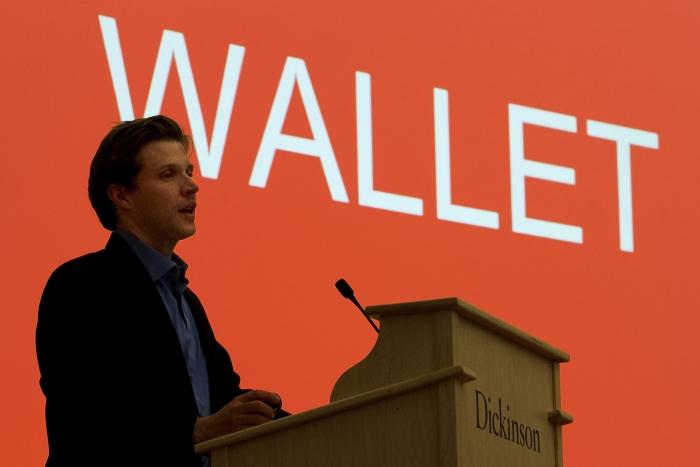In Code We Trust

Photo by Carl Socolow '77.
Innovation expert Alec Ross fleshes out the intricacies of bitcoin
by Tony Moore
Digital currency bitcoin hasn’t been around all that long, but global voices of influence have weighed in from the start, and thoughts on the effects of the cryptocurrency swing wildly. Most commenters, however, seem to fall in somewhere near Nassim Taleb, author of The Black Swan, who says that bitcoin is “the beginning of something great.”
If you read the headlines, though, bitcoin’s greatness is usually on the back burner, while up front the bitcoin carnival is on display. For instance …
Autumn Radtke, the American founder of one of the first bitcoin exchanges, was found dead in Shanghai, cause still unknown; Mt. Gox, the most visible exchange in the bitcoin realm, imploded and shut down (the day before Radtke’s death), losing and then finding millions of dollars’ worth of bitcoins; and the mysterious founder of bitcoin was unearthed in California by Newsweek only to have the Associated Press call it a case of mistaken identity a few days later.
At this point you’re thinking you might need a scorecard to keep up with the twists and turns and all the players. And if you were in Allison Hall last Wednesday, Alec Ross, one-time senior advisor for innovation to former Secretary of State Hillary Clinton and this year’s Poitras-Gleim Lecturer, was on hand to help you out.
Before his lecture, Ross (whose sister Catherine is a 1994 Dickinson graduate) spent the day sitting in on classes, including Assistant Professor of Political Science Sarah Niebler’s Political Behavior and Mass Media and American Politics courses, and met with student groups such as the Idea Fund and the Student Investment Group.
Once underway, Ross’s discussion, which he delivered before a packed house, led off with a history of currency and then moved to the topic at hand, bitcoin, which he called an “unregulated, frictionless system” of exchange.
“When we were little kids, money was something you carried in a wallet,” he said. “It had volume; it had breadth.” With bitcoin and other digital currencies, monetary exchange is facilitated through computer code—a series of 1s and 0s—and it’s fully out from under government regulation. Other nuggets included:
- There are only 21 million bitcoins, and the last of them won’t be mined until the year 2140.
- The average person cannot begin to unravel the intensely complex computations needed to mine bitcoins from the system, but there are high-powered computers around the world working on it.
- The name Satoshi Nakamoto, that of bitcoin's purported founder, may be be a portmanteau representing four major tech companies: SAmsung, TOSHIba, NAKAmichi and MOTOrola.
- China has banned the use of bitcoin, but Canada is contemplating creating its own cryptodollar.
- Bitcoin, while not the only cryptocurrency, represents a looming threat to nation-backed currency, and it’s giving central bankers around the world plenty of anxiety.
- And while Ross isn’t sure of bitcoin’s future, he sees it currently fitting into one of four possible categories: it’s a unit of stored value, a (highly volatile) variable asset, a Ponzi scheme or a protocol (a brilliant bit of coding that can be used to ensure authentic transactions).
Ross cites search engines such as Lycos and Altavista in drawing his conclusions on bitcoin: While they may not exist as they once did (or at all), the search engine itself evolved from these early iterations and became stronger in such current forms as Google. Bitcoin may not live forever, but the category of digital currency is here to stay. The only mystery is what form it will take in years to come.
Alec Ross is a senior fellow at Columbia University’s School of International & Public Affairs. He also serves as an advisor to investors, corporations and government leaders to help them understand the implications of factors emerging at the intersection of geopolitics, markets and increasingly disruptive network technologies. In his forthcoming book, to be published by Simon & Schuster, Ross discusses the industries and businesses of the future.
The annual Poitras-Gleim Lecture is organized by the Student Senate Public Affairs Committee.
Learn more
Dickinson's varied lectures and symposia
Published March 31, 2014